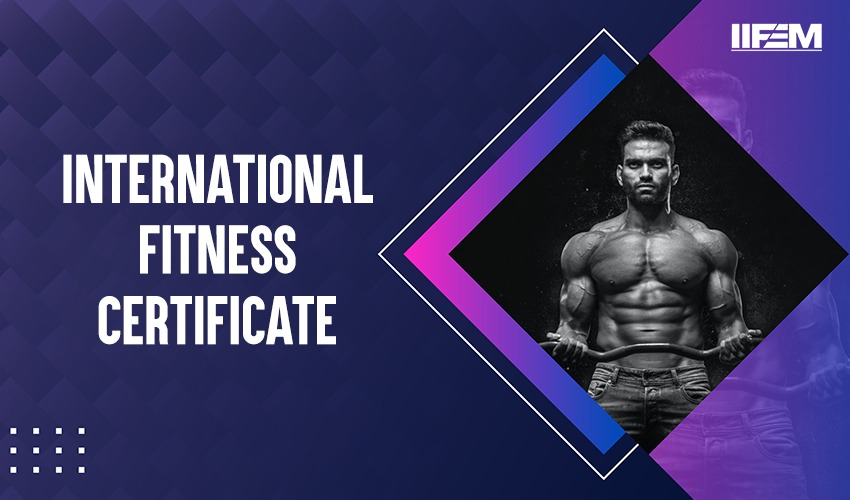
Top Career Paths You Can Pursue After Gym Trainer Certification
The global market for personal fitness trainers was valued at around $47.55 billion in 2025, showing a sharp rise in demand for certified professionals. As the fitness industry expands, completing a gym trainer certification opens doors to a range of career options. Trainers are needed not only in gyms but also in sports centers, wellness programs, and rehabilitation settings. A gym trainer course can lead to multiple rewarding career paths that offer personal growth, job satisfaction, and long-term professional stability.
Personal Training in Commercial or Private Settings
One of the most common roles after becoming a certified gym trainer is working as a personal trainer. This can take place in commercial gyms, boutique fitness studios, or private training setups. Trainers work one-on-one with clients to build custom fitness plans, track progress, and motivate them throughout their journey. Since results matter, building trust and a strong reputation is key in this space. As experience grows, so does the potential to work with higher-paying clients, including executives, athletes, or even celebrities.
Group Fitness Instruction
For those who enjoy working with multiple clients at once, group fitness instruction can be an exciting career choice. This role involves leading fitness classes such as strength training, functional workouts, bootcamps, and even HIIT sessions. Trainers in this field must be energetic, confident, and skilled at managing different fitness levels in a single class. Besides being a good income stream, it also helps trainers build visibility and personal branding faster than one-on-one sessions.
Sports and Athletic Coaching
A gym certification can be a solid foundation for becoming a sports coach or conditioning expert. Trainers who have a passion for sports can specialize in athletic performance, helping athletes improve speed, agility, power, and recovery. This path often includes working with schools, colleges, or sports academies. It's an ideal direction for those who want to blend fitness with competitive training environments.
Online Fitness Coaching
With digital fitness on the rise, many trainers are turning to online coaching. This career option offers flexibility, scalability, and global reach. After completing a gym trainer course, professionals can start offering services through personalized workout plans, live sessions, or even subscription-based programs. A strong social media presence and solid client results can help establish authority and attract a steady client base from anywhere in the world.
Strength and Conditioning Specialist
Strength and conditioning roles are designed for those who want to work on more technical aspects of training. These professionals often assist athletes or fitness enthusiasts in improving muscle performance, injury prevention, and recovery. It requires a deeper understanding of biomechanics, physiology, and structured program design. While the work can be intensive, it’s also highly rewarding, especially for those who enjoy precision and measurable results.
Fitness Facility Management
Some trainers decide to move beyond training and enter fitness facility management. Whether it’s a gym, wellness center, or corporate fitness unit, managers are responsible for operations, staff, client satisfaction, and revenue generation. This role suits those with leadership skills and an interest in business. It’s also a great way to blend fitness knowledge with entrepreneurship or administration.
Special Population Trainer
There’s increasing demand for trainers who specialize in working with special populations—such as seniors, individuals with chronic illnesses, or those recovering from injuries. This path requires additional education and sensitivity, but it allows trainers to make a significant impact on people’s lives. Helping someone regain strength, mobility, or confidence through movement can be one of the most fulfilling aspects of this career.
Table for Career Paths After Gym Trainer Certification
|
Career Path |
Setting |
Required Skills |
|
Personal Trainer |
Gym/Private Studio |
Communication, Custom Programming |
|
Group Fitness Instructor |
Fitness Class Studios |
Public Speaking, Energy, Coordination |
|
Sports Coach |
Schools, Colleges, Academies |
Athletic Conditioning, Leadership |
|
Online Coach |
Virtual Platforms |
Content Creation, Social Media |
|
Strength & Conditioning |
Sports Teams, Gyms |
Performance Training, Data Analysis |
|
Facility Manager |
Gym or Fitness Center |
Operations, Team Management |
|
Special Population Trainer |
Clinics, Senior Centers |
Rehab Knowledge, Compassion |
How IIFEM Can Support Aspiring Fitness Professionals
For trainers looking to grow their careers beyond basic certification, IIFEM offers specialized courses that bridge the gap between theory and real-world skills. Programs like Diet Management Specialist, Advanced Nutrition and Supplementation, Immunity Boosting Plan, and Sports Supplements Specialist provide the knowledge needed to serve clients better and stand out in a competitive market.
These advanced programs are designed to complement your gym trainer certification and open new doors in fitness, health, and nutrition coaching. Whether you want to guide clients with personalized meal plans or offer sports-specific nutrition advice, IIFEM helps turn your goals into achievements with science-backed education.
Faqs
1. What career opportunities are available after gym trainer certification?
Gym trainer certified professionals can work as personal trainers, group fitness instructors, sports coaches, online coaches, strength and conditioning specialists, fitness facility managers, or trainers for special populations.
2. Can I work online after completing a gym trainer course?
Yes. Online fitness coaching allows certified trainers to offer personalised plans, live sessions, and subscription-based programs globally, providing flexibility and scalable income opportunities.
3. How can I specialise as a strength and conditioning coach?
By building expertise in biomechanics, physiology, injury prevention and performance programming, trainers can work with athletes or fitness enthusiasts to improve strength, power and recovery.
4. What does a personal trainer do in private or commercial gyms?
Personal trainers create custom workout programs, monitor client progress, ensure proper technique and motivate clients to achieve fitness goals while building trust and reputation.
5. How can I work with special populations after certification?
Special population trainers focus on seniors, rehabilitation clients or individuals with chronic conditions, requiring additional knowledge in rehab, mobility and compassionate coaching.
Category
Recent Blog

Why is insulin neede... Read more
July 05,2023
10 Tips for Strength... Read more
August 14,2023
Sample Strength and ... Read more
September 06,2023
Why are some lifters... Read more
September 15,2023
Why do Barbells and ... Read more
September 22,2023
Secret Routine to Bu... Read more
September 26,2023
When to use Insulin,... Read more
September 28,2023
Why lifters should u... Read more
September 29,2023
What is power traini... Read more
October 09,2023
The Future of Fitnes... Read more
October 17,2023
Why Pursue a Fitness... Read more
October 21,2023
Career Paths for Cer... Read more
October 31,2023
Elevating Your Perso... Read more
November 21,2023
Gym Safety Correctiv... Read more
December 26,2023
5 Different Types of... Read more
December 27,2023
Elevate Your Fitness... Read more
December 28,2023
Embark on Your Fitne... Read more
January 24,2024
Mastering Nutrition ... Read more
January 24,2024
Building Strength wi... Read more
January 27,2024
Boost Your Career: B... Read more
January 27,2024
7 main reasons why y... Read more
February 15,2024
Unlocking Essential ... Read more
February 19,2024
Unlock Your Fitness ... Read more
February 20,2024
Unveiling the Path t... Read more
February 28,2024
How to choose the ri... Read more
February 29,2024
Strengthening Weak S... Read more
March 20,2024
How a Fat Loss and E... Read more
March 27,2024
Transformative Insig... Read more
March 27,2024
The Importance of a ... Read more
April 10,2024
Mastering the Art of... Read more
April 22,2024
Unlocking Your Caree... Read more
April 23,2024
The Evolution of Per... Read more
May 27,2024
Elevate Your Fitness... Read more
May 28,2024
Choosing the Right P... Read more
June 25,2024
Role of Protein in F... Read more
June 26,2024
Career Opportunities... Read more
June 27,2024
How Fitness Certific... Read more
July 29,2024
Building a Successfu... Read more
July 30,2024
Qualities to Look fo... Read more
August 21,2024
How Gym Trainer Cert... Read more
August 28,2024
How Fitness Trainer ... Read more
September 20,2024
The Role of a Person... Read more
September 23,2024
Immunity Boosting Pl... Read more
October 17,2024
How Fitness Trainers... Read more
October 22,2024
Transform Your Fitne... Read more
October 28,2024
Certified vs. Uncert... Read more
November 22,2024
The Role of Nutritio... Read more
November 25,2024
The Importance of Co... Read more
December 28,2024
5 Powerlifting Train... Read more
December 28,2024
How Personal Trainer... Read more
January 24,2025
Essential Online Nut... Read more
January 25,2025
How Personal Trainer... Read more
January 27,2025
5 Immunity-Boosting ... Read more
March 01,2025
What to Look for in ... Read more
March 01,2025
The Impact of a Pers... Read more
March 27,2025
The Benefits of Beco... Read more
March 28,2025
How to Choose the Ri... Read more
April 24,2025
Turbo Test: Unlockin... Read more
April 25,2025
How to Build a Perfe... Read more
April 29,2025
10 Powerful Yoga Asa... Read more
May 24,2025
How to Track Your Ca... Read more
May 26,2025
Fast-Track Your Fitn... Read more
May 28,2025
10 Reasons to Enroll... Read more
June 23,2025
How to Turn Your Pas... Read more
June 28,2025
Trainer vs Coach Wha... Read more
June 30,2025
How IIFEM Plans to C... Read more
July 01,2025
Go Global with IIFEM... Read more
July 11,2025
How to Avoid the Top... Read more
July 22,2025
No English No Proble... Read more
July 25,2025
How Education Can El... Read more
August 19,2025
Real Stories from II... Read more
August 20,2025
Why Gym Owners Prefe... Read more
August 26,2025
How Science Based Tr... Read more
August 31,2025
Why an International... Read more
September 10,2025
What Makes IIFEM the... Read more
September 15,2025
How to Build a Succe... Read more
September 22,2025
Your Passion and Our... Read more
September 27,2025
Fat Loss & Endurance... Read more
October 16,2025
Benefits of Whey Pro... Read more
October 21,2025
Strength and Conditi... Read more
October 27,2025
From Trainer to Gym ... Read more
October 29,2025
Powerlifting Trainin... Read more
November 12,2025
Pre-Workout vs Post-... Read more
November 17,2025
Building a Hybrid Fi... Read more
November 19,2025
Why Most Weight Loss... Read more
November 21,2025
Why Great Coaches Do... Read more
December 18,2025
Integrating Yoga for... Read more
December 18,2025
From Fitness Coach t... Read more
December 18,2025
Personal Trainers Sa... Read more
January 16,2026
Diploma in Gym Manag... Read more
January 16,2026



